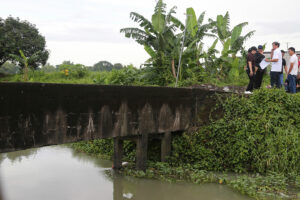PHILIPPINE oversight agencies have intensified their scrutiny of the initially flagged 421 infrastructure projects, with particular focus on 80 initiatives involving 15 to 18 contractors earlier identified by President Ferdinand R. Marcos, Jr. for potential anomalies, officials said on Wednesday.
The Independent Commission for Infrastructure (ICI), along with the Office of the Ombudsman, Department of Justice (DoJ), National Bureau of Investigation (NBI), Department of Public Works and Highways (DPWH), Philippine National Police, and Armed Forces of the Philippines, held a high command conference to coordinate the probe into alleged irregular flood control and infrastructure projects.
The meeting aimed to align efforts and craft a unified action plan for investigating, gathering data, and prosecuting individuals and entities linked to anomalous infrastructure activities.
ICI special adviser General Rodolfo S. Azurin, Jr. said teams were deployed to monitor and validate the projects on the ground.
“Last week, we were in Davao. This week, we intend to go to the Ilocos region, and by Sunday, we hope to be in Cebu,” Mr. Azurin told reporters at Camp Crame.
He said investigators will focus on Central Cebu, including Cebu City, which suffered severe flooding due to Typhoon Kalmaegi, locally called Tino.
“We want to see why these projects failed despite significant funding,” he said, referring to the P26 billion reportedly disbursed for flood control projects that were either incomplete or substandard.
The ICI is working closely with the Criminal Investigation and Detection Group and the NBI for document collection, leveraging their subpoena powers. “We need to study the documents and monitor actual implementation,” Mr. Azurin said.
“All concerned agencies should have their own areas of inquiry,” he added, noting the Bureau of Internal Revenue, Department of Trade and Industry, and Bureau of Customs among others could contribute to the investigation.
He said the commission is prioritizing 80 projects linked to the 15 to 18 contractors identified by the President. “The goal is to build solid cases where violations are found,” he noted.
The ICI targets to complete its field assessments swiftly to ensure anomalies are addressed and accountability enforced. “Our teams will continue site visits, documentation reviews, and coordination meetings to fast-track the investigation,” Mr. Azurin said.
Public Works Secretary Vicencio B. Dizon stressed the need for a systematic approach, citing the participation of multiple agencies including the emergency management team, the NBI, DoJ, and other enforcement units.
“The purpose of this meeting is to expedite and expand coverage,” Mr. Dizon said. “There are thousands of projects, and we need to validate each one quickly and systematically.”
He said each team must have full access to DPWH documents to inspect and validate projects efficiently so that cases can be filed without delay. The participation of police and military personnel, he added, ensures on-ground validation and logistical support.
Mr. Dizon said several cases have already been filed with the Ombudsman, with about 40 individuals expected to face jail time once the non-bailable charges proceed.
Authorities are also reviewing a 2017 master plan to compare proposed and implemented projects. “We are assessing the discrepancies holistically with support from Project NOAH, the University of the Philippines, and the Department of Environment and Natural Resources,” he said.
MORE ‘GHOST’ PROJECTS
Meanwhile, the Commission on Audit (CoA) said it filed fresh fraud reports on P344 million worth of flood control projects in Bulacan, flagging irregularities to the ICI and exposing further corruption in public works.
In a statement on Tuesday, the state auditing body said that four riverbank projects across tributaries in the flood-prone province were “highly irregular,” with one structure flagged as complete despite being nonexistent.
State auditors said those involved with the projects could face graft and corruption charges, as well as malversation and falsification cases if found liable.
“These new filings are part of CoA’s continuing efforts to hold erring officials and contractors accountable for the misuse of public funds,” the auditing body said. “The public can expect additional reports to be submitted to the ICI as the agency’s audit investigation continues.”
Authorities have sped up probes into projects allegedly tied to a multibillion-peso kickback scheme involving politicians, state engineers and contractors, as public pressure for accountability continues to mount.
The scandal had struck a chord among Filipinos due to the scale of alleged collusion aimed at siphoning government funds from public works widely seen as essential in the flood-prone nation.
A province north of the Philippine capital, Bulacan has stood as the ground-zero of the unfolding public works scandal as its low-lying geography makes flood control projects a necessity for communities.
In its latest report, CoA revealed that a P74.15-million riverbank structure in Baliuag City north of Bulacan did not exist, despite being marked completed.
“No flood control structure was built by the contractor at the approved site,” state auditors said.
Another embankment structure worth P96.49 million in Baliuag City spanning 229-meters was a “redundancy” project, considering the public works contract involved a site with an existing flood control structure, which was already showing “several defects and cracks.”
In Balagtas municipality, state auditors flagged a project costing P96.49 million, which spanned 228 meters of the Balagtas River, as another redundant structure.
The agency also reported an incomplete flood control structure in Malolos City worth P77.19 million.
“CoA found a structure spanning 55 meters long at the approved location, which is 148.8 meters short of the agreed length,” state auditors said. “At the site pinpointed by the Department of Public Works and Highways, no flood control structure was seen by CoA despite the project being tagged as 100% complete.”
“The audit findings will aid the ICI in its investigation of irregularities in government infrastructure projects,” CoA said. — Erika Mae P. Sinaking and Kenneth Christiane L. Basilio
